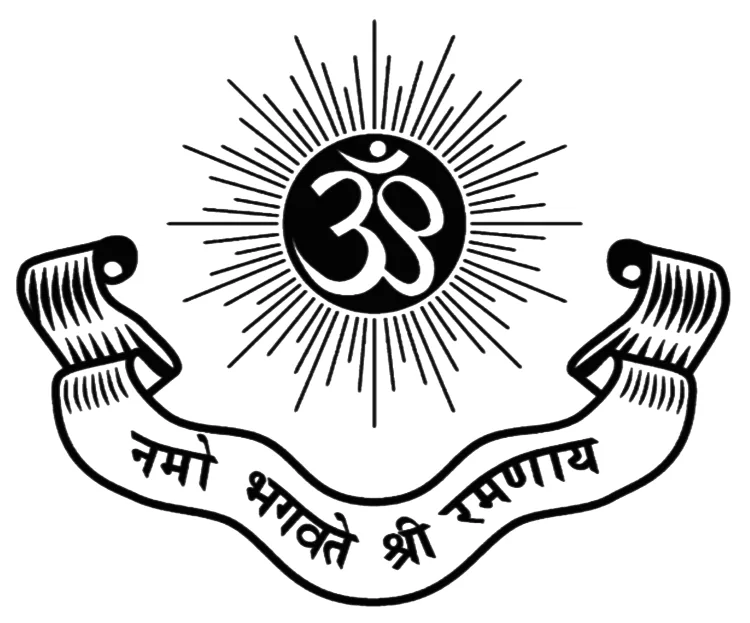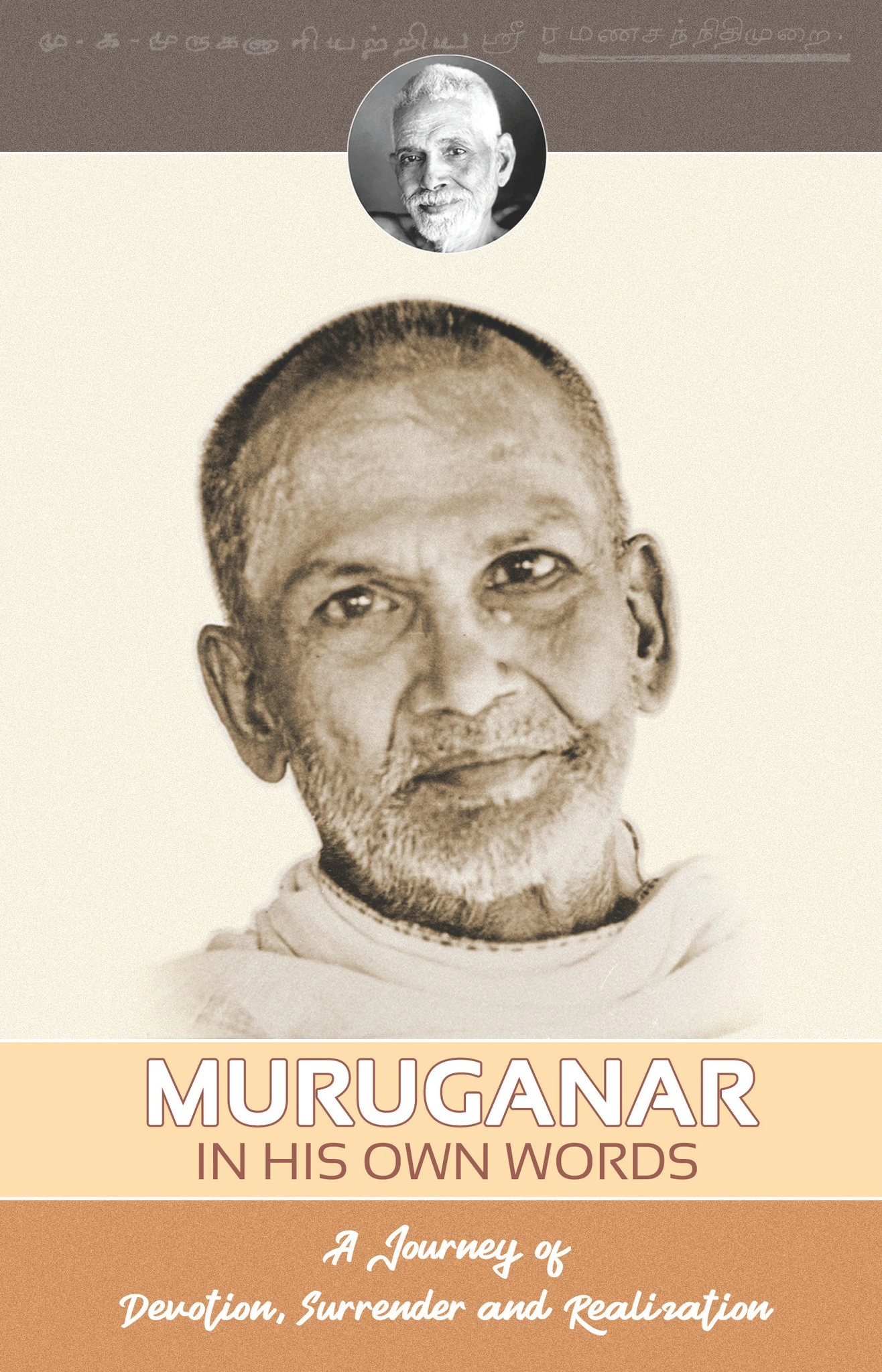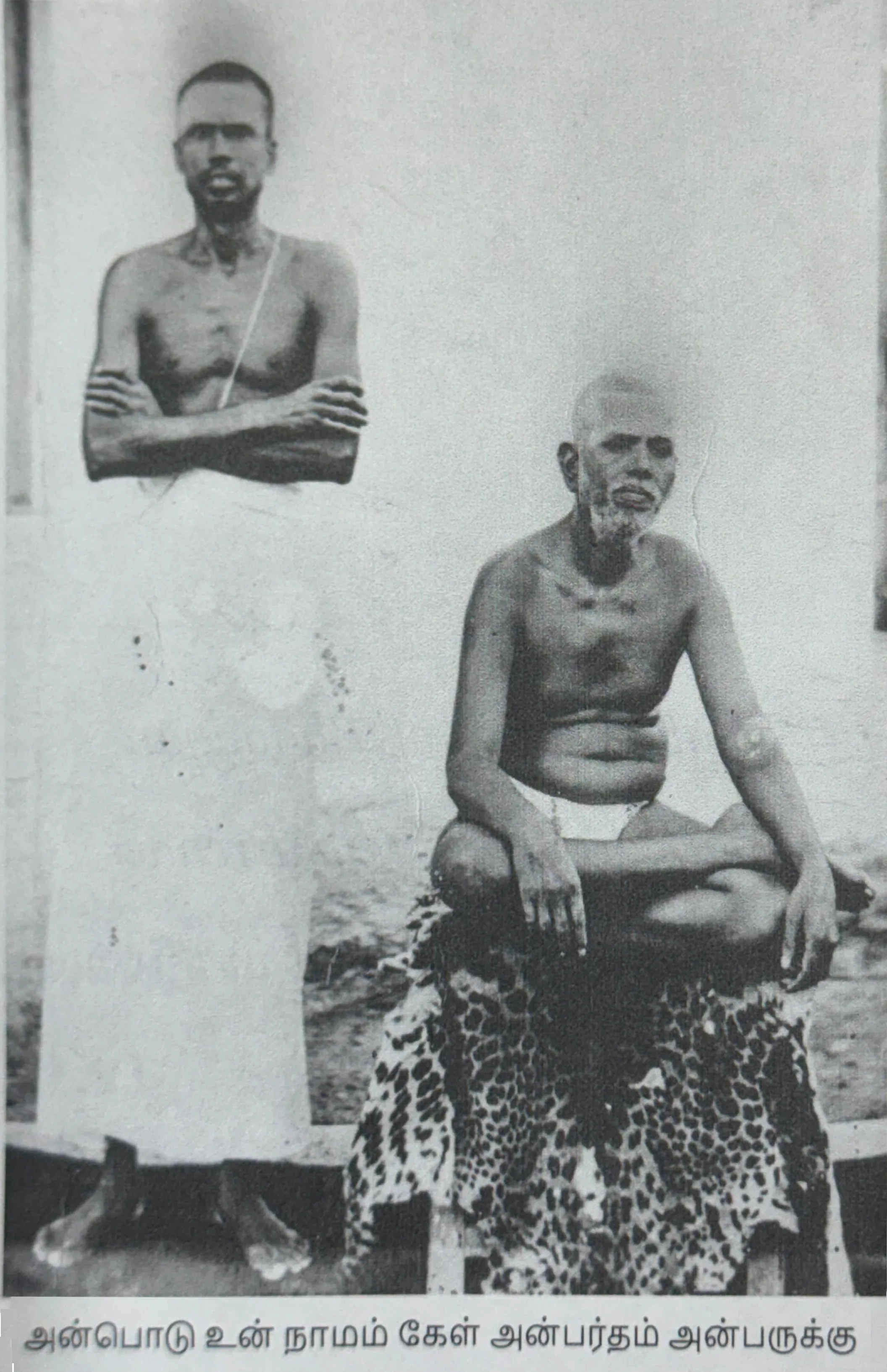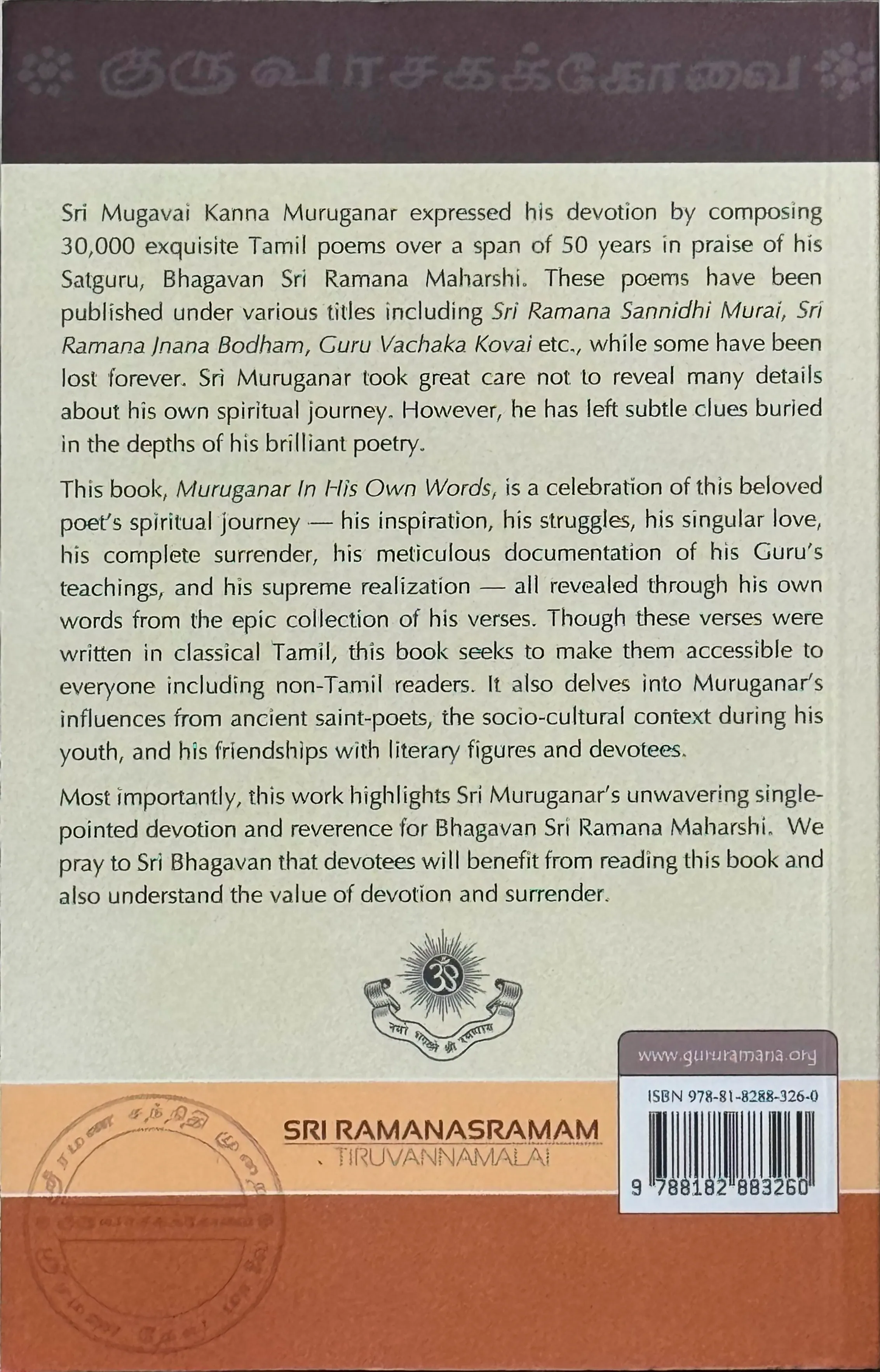excerpts,citations

© Sri Ramanasramam
Tiruvannamalai 606 603
INDIA
Published by Venkat S.Ramanan
First Edition 2024, 100 copies
CC No.1181
ISBN: 978-81-8288-326-0
Printed by: REPRO India Private, Ltd.
Mumbai 400 013














To All Devotees of Bhagavan
whose devotion and surrender
have influenced every letter in this book







Table of Contents
Publisher’s Note
Foreword - 1
Foreword - 2
Preface
1 Background
1.1 Bhagavan Sri Ramana Maharshi
1.2 A Brief History of Tamiḷ Devotional Poetry
1.3 Tamiḷ Renaissance in the 19th Century
1.4 Indian Independence Movement
1.5 Brief Biography of Muruganar:
The Tamiḷ Poet and Devotee
2 Inner Turmoil and Journey to Resolution
2.1 Ignorance and Awareness of Ignorance
2.2 Inner Emotional Conflict
2.3 Path to Resolution
2.4 Discovering a Lasting Resolution
3 Arrival at the Feet of Bhagavan
3.1 Devotion and Surrender: Muruganar’s Journey Prayer
3.2 Hearing and Meditating on the Divine Pull Towards Bhagavan
3.3 Discovering Life’s Purpose
3.4 Blessed with the Experience of the Self
3.5 The Unspoken Wisdom of Bhagavan’s Clue
4 Divine Devotion to Bhagavan
4.1 Unconditional and Exclusive Love
4.2 Boundless Love for the Beloved
5 Echoes of Grace — Muruganar’s Encounters with Bhagavan
5.1 Bhagavan’s Love for Muruganar’s Words
5.2 Removing Muruganar’s Residual Bondage
5.3 Waves of Compassion: A Fish in the
Ocean of Bhagavan’s Grace
5.4 Majestic Modesty: Lord’s Attire in a Loincloth
5.5 Certification of Grace
5.6 Verses on Festivities: Deepavali, Pongal and Other Festivals
6 Bhagavan’s Poetry with Muruganar
6.1 A Journey from Silence: Fostering Bhagavan's Poetry
6.2 Upadesa Undiyar
6.3 Atma Vidya Kirtanam
6.4 Ulladu Narpadu (Reality in Forty Verses)
Ulladu Narpadu Anubandham (The Appendix)
7 Timeless Melodic Memories
7.1 Influences From thé Past
7.2 Tributes to Tiruvasagam
7.3 Odes to Tevaram
7.4 Salutations to Titans: Avvayar, Tiruvalluvar and Kambar
7.5 Inspirations from Other Saints, Poets and Literary Works
8 Elevating Devotion in the Contemporary and Future Eras
8.1 The Grandfather of Tamiḷ and His Students
8.2 Muruganar and Two Raghava Iyengars
8.4 Sri Ramanapadananda’s Reverence
8.5 Friendship with Four Scholarly Devotees
8.6 Bhagavans Secretaries
8.7 Collaborative Literary Works, Translations, and Compositions
8.7.1 Poetic Allure: Drawing an Oxford Scholar
8.7.2 Committed Endeavors of Sri Sadhu Om
8.7.3 Official Biographer of Muruganar: Smt.T.R.Kanakammal
8.7.4 Wonderful Works of Devotees, Scholars, and Collaborators
9 Bhagavan’s Teachings Explained
9.1 Muruganar’s Practical Guidance
9.2 Commentary on Upadesa Undliyar
9.3 Explanation of a verse from Ulladu Narpadu
9.4 Bhagavan's Biography
Afterword
Acknowledgements
Appendix 1
Footnotes
back cover
Path to Resolution
Discovering a Lasting Resolution
Muruganar embarked on a transformative journey and achieved perfect clarity at the feet of Bhagavan. Following their initial meeting, his inner conflicts gradually dissolved, and his mind grew stronger in Bhagavan's presence. Muruganar firmly decided not to praise any other human or seek another guru for spiritual guidance besides Bhagavan. With this resolution, his attraction to the nationalistic movement waned. While he maintained utmost respect for Gandhi, his primary pull remained directed towards Bhagavan.
When Muruganar presented the initial set of twelve verses, Bhagavan Sri Ramana recognized Muruganar's exceptional talent in composing poetry, reminiscent of the legendary ancient Tamil literary and devotional poets. Following his initial visit, Muruganar returned to see Bhagavan on several occasions. During one of these visits, Bhagavan commented that if Muruganar continued to compose in a similar manner, he could potentially create a treatise akin to Tiruvasagam. Deeply humbled by this statement, Muruganar perceived it as a divine sign from his Sadguru and embarked on a journey of composing verses dedicated to Bhagavan from that moment onward.
Reflecting on why Muruganar composed[59] so many verses in praise of Bhagavan, he wrote the following verse:
ஊன மகன்ற ஒளிசே ரனுபவமெய்ஞ் ஞான மணங்கமழ்செந் நாவினால் – மோனவருட் பார்வையா லாண்டகுரு பாதானு பூதிசொலல் சேவையாத் தேறுகின் றேன்
ūṉa makaṉṟa ŏl̤ice raṉupavamĕyñ
ñāṉa maṇaṅkamaḻcĕn nāviṉāl – moṉavaruṭ
pārvaiyā lāṇṭakuru pātāṉu pūticŏlal cevaiyāt teṟukiṉ ṟeṉ
Removing the evil mind, his light shone as wisdom, which is the experience of the Self. Such an experience is bestowed upon me because of my Lord's (Ramana’s) gracious gaze. I sing his praises through my words, as my sole service and the purpose of my life.
In this verse, Muruganar articulates an important spiritual transformation and the central role that Bhagavan Ramana played in it. The phrase “removing the evil mind” signifies the purification of one's consciousness from the impurities of worldly desires, attachments, and egoic tendencies. More importantly, his conflict completely disappeared under Bhagavan’s gaze.
When Muruganar states, “his light shone as wisdom, which is the experience of the Self,” he is describing a state of realization where the seeker's inner light, representing divine wisdom and Self-awareness, becomes fully illuminated. It signifies the direct realization of one's true nature as the eternal, unchanging, and interconnected Self beyond the egoic identity.
The line, “Such an experience is bestowed upon me because of my Lord's gracious gaze,” underscores the role of the guru or spiritual teacher in guiding the disciple towards Self-realization. Bhagavan Ramana's mere presence had a transformative effect on many devotees, and Muruganar acknowledges that it was through Bhagavan's benevolent gaze that he was blessed with this spiritual experience.
This verse culminates with Muruganar's resolute dedication to his life's purpose: extolling the virtues of Bhagavan Ramana through his poetic expressions. This act of devotion and expression of gratitude serve as his primary offerings, vividly highlighting the great influence Bhagavan had on his life. In these verses, Muruganar masterfully encapsulates the essence of the guru-disciple relationship and the inner transformation brought about by the benevolent gaze of a guru. Although Muruganar never underwent formal initiation as a Hindu monk, permanently relocating to Tiruvannamalai in 1962[60] to live in close proximity to his Guru, Bhagavan Sri Ramana, marked the beginning of Muruganar’s new life. He made a solemn commitment to compose exclusively on the subject of Sri Bhagavan and vowed never to worship or pray to any other deity. Until his passing in 1973, he lived as a mendicant, preferring to be recognized as a devoted follower of Bhagavan Sri Ramana above all other titles or accolades.
Upon entering the proximity of Bhagavan Sri Ramana, he dedicated every ounce of his inner attention to him and was blessed with Sri Bhagavan's Grace. His initial collection of verses was published under the title Sri Ramana Sannidhi Murai in 1933, comprising 1851 Tamil verses, totaling well over 14,000 lines, all in praise of Bhagavan Sri Ramana.
Subsequently, he continued to compose over 28,000 verses, all dedicated to the singular praise of Sri Bhagavan. In many instances, he would question, “Why should I contemplate praising anyone but you, O Ramana, for you are the embodiment of Sat Chit Ananda?”
Muruganar's literary prowess stands on par with the finest poets in Tamil Bhakti literature, a fact subtly acknowledged by Bhagavan Sri Ramana in more than one instance. He composed thousands upon thousands of Tamil verses, with Sri Bhagavan as his sole subject. We are fortunate to have many thousands of these verses in our possession, but we have also lost many more, for they were not written with the intention of being read by others.
In certain instances, Muruganar did not feel the need to preserve these verses; the poetic flow came to him naturally, driven solely by the presence of Sri Bhagavan, or more precisely, the inner Sri Bhagavan residing in the lotus of Muruganar's heart. He would write such verses on a slate with chalk, and when the next verse came to him, he would simply erase the previous one to write the next.
Muruganar held a steady conviction that he did not write any of these verses about Bhagavan. Muruganar realized that these verses were authored by Bhagavan, about Bhagavan, with Muruganar merely serving as a medium through which these verses were penned. He saw himself as nothing more than an instrument carrying out the will of his inner Bhagavan. Bhagavan, on his part, took care of Muruganar at every step of his journey.
To illustrate Muruganar’s devotion and Bhagavan’s grace, there is an exemplary incident we have learned of through a biography on Muruganar authored by Smt.T.R.Kanakammal.
Muruganar decided to engage in begging to earn his food, firmly believing that it would help diminish his ego. This meant there were days when he might go without food, as he couldn't always undertake a begging round. On one such occasion, when Muruganar was fasting due to not begging, it happened to be Maha Sivaratri, and he was unaware of this fact.
The following day, when Bhagavan Sri Ramana embarked on the girivalam, a 14 km circumambulation around Arunachala Hill, Muruganar also joined him. However, due to his continued fasting from the previous day, Muruganar was extremely fatigued. Recognizing Muruganar's exhaustion, Bhagavan remarked, “Did you observe Sivaratri fasting yesterday? Come with me; we shall go to the Ashram kitchen to have a meal.”
In this way, Bhagavan kindly invited Muruganar to partake in a meal at the ashram's kitchen. Muruganar was inspired to compose the following verse about this incident:61]
திருநாட் சிவராத் திரியெனத் தெரியாது ஒருநாள் பட்டினி யிட்டெனை மறுநாள் விசர்புற வலம்புரி வித்தரு ணந்தனைப் பசிப்பதம் அறிந்துஊண் பரிந்தளிப் பித்தும்
tirunāṭ civarāt tiriyĕṉat tĕriyātu
ŏrunāl̤ paṭṭiṉi yiṭṭĕṉai maṟunāl̤
vicarpuṟa valampuri vittaru ṇantaṉaip
pacippatam aṟintuūṇ parintal̤ip pittum
I was not aware that it was Sivaratri. He made me unintentionally fast on that day. The next day, he took me for Giri Pradakshina. Recognizing my hunger, he graciously offered me food. His boundless compassion touched my heart deeply.
Smt.T.R.Kanakammal observed that whenever Muruganar spoke of this incident, he would become emotional and tears would well up in his eyes. He would often find it difficult to continue speaking, so great was his gratitude for Bhagavan's boundless compassion.
Scriptures proclaim that fasting on a Sivaratri day bestows great divine Grace from Shiva. In Muruganar's case, although the fast was unintentional, it granted him the greatest blessing of receiving Bhagavan's compassion and the assurance that Bhagavan indeed watches over his devotees.
Muruganar's inexorable dedication to his master's teachings and his abidance at Bhagavan's feet are emblematic of his spiritual strength and glory. His life shows that genuine spiritual progress cannot be gauged solely by literary accomplishments or scholarly pursuits. Instead, it hinges on the depth of one's connection with their spiritual guide and the authenticity of their inner journey, which is symbolized by Muruganar’s attitude: if scholarly pursuits do happen to unfold naturally, they should be allowed to do so without being obstructed by the ego.
Bhagavan never forsook Muruganar; it might not have been apparent to others, perhaps even irrelevant to anybody other than Muruganar himself. Repeatedly, Muruganar attests to the fact that Bhagavan looked after his physical, mental, emotional, and spiritual well-being, possibly even more diligently than a mother would protect her cub.
Muruganar confirmed Bhagavan’s grace in multiple verses, and in verse 1221[62], he explicitly said how much Bhagavan protected him:
என்னைத்தன் பாலே யிருத்தியெனக்(கு) இன்னமுதத் தன்னருள்பா லித்த தயாசொருபன் – அன்னையினும் மிக்கபே ரன்பு விளங்குசிவச் சீர்மையென்னுள் சிக்கெனவே தொக்கது சீர்த்து
ĕṉṉaittaṉ pāle yiruttiyĕṉak(ku) iṉṉamutat
taṉṉarul̤pā litta tayācŏrupaṉ – aṉṉaiyiṉum
mikkape raṉpu vil̤aṅkucivac cīrmaiyĕṉṉul̤
cikkĕṉave tŏkkatu cīrttu
Meaning: He drew me into his embrace and retained me to bestow his divine nectar of grace. His very form is an embodiment of love itself. He showered upon me a love so profound, surpassing even that of my own mother, to eternally establish the auspicious glory of Lord Shiva within my heart.
Muruganar's legacy continues as an enduring source of inspiration, reminding us that the path to Self-realization isn't about accumulating knowledge or accomplishments, but about surrendering the ego and experiencing the connection with the divine. His life story continues to inspire and guide us on our quest for liberation, emphasizing the enduring importance of sincere devotion, absolute surrender, and steadfast abidance in the spiritual heart. It teaches us to allow life's events to unfold, be they pleasant or otherwise.
Indeed, along the way, Muruganar arose as one of the greatest poets nurtured by mother Tamil, who endowed him with a magnificent faculty and intellect to employ her beautiful language in singing, worshiping, celebrating, blessing, and immersing himself in the bliss and devotion experienced while worshiping his beloved Lord Ramana.
As we reflect upon his legacy, is there another poet, in any language, from any era, residing in any corner of the world, belonging to any religion, who has displayed such unwavering devotion as Muruganar did, while filling every fiber of their very being with devotion to their living Sadguru and glorifying the divine brilliance of that Sadguru so splendidly?
Muruganar built a poetic monument for his Sadguru, Bhagavan Sri Ramana, unlike any other disciple in history has done for a living guru. This monument stands for all to see, appreciate, and marvel at for ages to come. However, comprehending its significance requires careful perception. Unlike conventional monuments, Muruganar laid the foundation for this monument through his own realization. Each verse he composed serves as a brick, his devotion acts as the mortar, his unconditional love is the water, and Bhagavan's grace is the cement binding it all together. Brick by brick, he constructed his masterpiece, which demands the reader's imagination, devotion, and realization to fully grasp and admire it. Within this monument, he placed an enormous throne – one that resides perpetually in every heart, yet remains often misunderstood and unrealized. Muruganar spent numerous lifetimes preparing this throne, meticulously crafted through years of solitude, surrender, and, above all, soliciting the grace of his Sadguru. In that throne, his Sadguru, Lord Ramana, is seated in all His glory and radiance, quietly observing, guiding, and embodying the perception of all perceptions. He remains unrelenting, never weary of the antics of egos, sustaining each life with His complete silence, ever ready to assist anyone who surrenders to His grace.
Prof.K.Swaminathan movingly wrote, “To practice His presence and to explain His teachings the poet uses words, which whether richly sensuous or austerely intellectual, are invariably appropriate, while his repertoire of metrical forms is astounding in its vastness, flexibility and power. Like some great temple complex, with its shrines and towers, its tanks and groves, the immense output of this poet constitutes a massive and worthy literary monument to the Master, whose mighty message Sri Muruganar manages to convey, because he is himself a consummate and humble scholar, manipulating with unerring tact and taste the inexhaustible resources of an ancient and still living language unsurpassed in the range, depth and continuity of its devotional and metaphysical poetry.”
Prof.K.Swaminathan aptly encapsulated an extraordinary historical event. No other culture, religion, land, or language has witnessed anything quite like what transpired with Muruganar. No individual has composed over 30,000 verses exclusively dedicated to their living Guru to the exclusion of all else. Muruganar, even though he had forsaken all material possessions and lived a life devoid of worldly attachments, has erected the grandest and most unassailable monument to his Guru and personal deity, Bhagavan Sri Ramana, through his absolute surrender and boundless imagination. He allowed his own master to channel the creation of these verses. This represents the highest form of surrender, wisdom, devotion, and yoga – precisely what Bhagavan Krishna urged Arjuna to embrace.







9. Bhagavan’s Teachings Explained
9.1 Muruganar’s Practical Guidance
Through his poetry, Muruganar imparts practical advice to sincere seekers, offering valuable guidance on their spiritual journey. His verses serve as a boundless source of spiritual wealth, allowing any seeker to mine unlimited treasures for their path. Covering the importance of Self-enquiry, as well as the nuances of surrender and devotion, Muruganar's insights and the clarity of his expression create a rich reservoir of teachings that accompany the journey toward realization, making it less solitary.
His poetry acts as the best motivation for the weary, a wonderful medicine for the emotionally distressed, a devotional antidote to pessimistic moments, a clairvoyant for closed minds, a caring love for the angered, and compassion for the sinners. Muruganar's verses are multifaceted tools, addressing various facets of the human experience on the spiritual path, providing solace, inspiration, and spiritual insights.
In contemplating Muruganar's verses, one can discern a comprehensive manual for seekers, covering diverse topics such as the nature of the Self, the significance of inner silence, and the importance of devotion. Each poem is like a seed with the potential to blossom even the most closed heart, illuminating the darkest corners of the inner recesses. Indeed, the abundance of spiritual guidance embedded in Muruganar's poetry suggests the potential for a dedicated book that systematically explores and expounds upon his teachings. Such a book could serve as a valuable companion for seekers, offering insights, practical advice, and timeless wisdom distilled from the poetic expressions of Muruganar's devotion to Bhagavan Sri Ramana Maharshi. Readers may consider this section merely a glimpse into the immense treasures that reside within his verses as it contains only a few verses selected from the vast ocean of Muruganar's poetic wealth.
In emphasizing the significance of Self-enquiry, Muruganar asserts that it is the sole path to pursue for attaining perfect happiness and bliss.[457]
உய்யவே வேண்டுவோர் ஊக்கமா உள்ளத்திற் செய்யவே தக்க சிவயோக சாதனையைத் தொய்ய விடாதுதினந் தோறும் மகிழ்ச்சிபொங்க ஐய னருளைமுன்னிட் டாற்றக் கடவரே
naṭakkumā ṟĕllā naṭakkave nokki
naṭakkumam moṉame ñāṉam – naṭukkaṭ
kuṟukkuccā loṭṭuṅ kuṟumpumaṉac ceṭṭai
yaṟakkaṭintu vāḻta laṟivu
Devotees who seek to live eternally should enthusiastically engage in the most important sadhana: the pursuit of the Self within one's heart through the practice of Self-enquiry, Siva Yoga. They should do so without interruption, pursuing it daily with overflowing happiness, guided by the blessings and Grace of our Lord Bhagavan.
What is the most practical way to attain wisdom? According to Muruganar, it is to lead a dispassionate life without interfering with the unfolding activities of the world.[458}]
நடக்குமா றெல்லா நடக்கவே நோக்கி நடக்குமம் மோனமே ஞானம் – நடுக்கட் குறுக்குச்சா லோட்டுங் குறும்புமனச் சேட்டை யறக்கடிந்து வாழ்த லறிவு
naṭakkumā ṟĕllā naṭakkave nokki
naṭakkumam moṉame ñāṉam – naṭukkaṭ
kuṟukkuccā loṭṭuṅ kuṟumpumaṉac ceṭṭai
yaṟakkaṭintu vāḻta laṟivu
Wisdom lies in maintaining silence while patiently observing the unfolding of events in the world. Interfering with worldly activities stems from the restlessness of the mind. True wisdom is found in living with tranquility.
Furthermore, he elaborates on how to lead a life without experiencing pain from anything in another verse.[459]
ஒன்றிலுந் துன்பம் உழவாமைக் கேதுவா என்றென்றும் நல்லோர்க் கியல்பா விருக்குநலன் அன்றென் றெதையுந்தா மன்றா தெவற்றையுமே நன்றுநன் றென்று நடக்குமனப் பான்மையே
ŏṉṟilun tuṉpam uḻavāmaik ketuvā
ĕṉṟĕṉṟum nallork kiyalpā virukkunalaṉ
aṉṟĕṉ ṟĕtaiyuntā maṉṟā tĕvaṟṟaiyume
naṉṟunaṉ ṟĕṉṟu naṭakkumaṉap pāṉmaiye
Great individuals harbor no hatred towards anything. Even amid circumstances that may seemingly pose challenges, they accept and maintain a mindset that perceives inherent goodness. Such individuals do not experience pain; rather, they embrace happiness.
While encouraging his devotees to engage in sadhana, Muruganar provides substantial assurance regarding what happens in case they encounter limitations in their practice in the following verse.[460]
தம்மால் இயன்றவரை சாதனைதாஞ் செய்தாரேல் தம்மால் இயலா ததைத்தம்மான் சாதிப்பான் தம்மால் இயன்றதுமே தாஞ்செய்யத் தப்பினரேல் தம்மான் அருளுக்கோர் சற்றுந் தவறின்றே
tammāl iyaṉṟavarai cātaṉaitāñ cĕytārel
tammāl iyalā tataittammāṉ cātippāṉ
tammāl iyaṉṟatume tāñcĕyyat tappiṉarel
tammāṉ arul̤ukkor caṟṟun tavaṟiṉṟe
When devotees engage in sadhana to the best of their abilities, our Lord will accomplish for them what they cannot achieve on their own.
Even if devotees cannot complete what is within their reach, there is no shortage of His grace, and He will not regard their inability to finish as a mistake. The second sentence is a very important assurance. He doesn’t penalize anyone for not completing what is possible in one’s sadhana. His grace will continue to be available! However, Muruganar cautions us against becoming attached to pride and fame.[461]
வீண்பெருமை கொண்டு விசைந்தெழுந்து வீழாதீர் காண்பறியா மேலோர் கதைநீர் அறிவீரே மாண்பதவாழ் வான மகத்துவஞ்சேர் தன்னியலைக் காண்பவரார் கர்த்த னருட்கண்காட் டாவிடிலே
vīṇpĕrumai kŏṇṭu vicaintĕḻuntu vīḻātīr
kāṇpaṟiyā melor katainīr aṟivīre
māṇpatavāḻ vāṉa makattuvañcer taṉṉiyalaik
kāṇpavarār kartta ṉaruṭkaṇkāṭ ṭāviṭile
Do not stumble by attaching yourself to useless pride and fame. Do you not know the story of Brahma and Vishnu, who couldn't perceive the entirety of the column of light that radiated as Arunachala? Who can behold the glorious Self, which bestows all wealth, without the gracious eyes of the ordainer revealing the truth?
To counter the distracting thoughts of pride and fame, Muruganar advises continuous meditation, as expressed in the following verse[462] presented in the enchanting form of Kural Venba. Additionally, this meditation involves steadfastly holding the holy feet of the Lord in one's heart.
அண்ண லருட்சே வடியை மகிழ்கூர வெண்ணுவார்க் கில்லை யிடர்
aṇṇa laruṭce vaṭiyai makiḻkūra
vĕṇṇuvārk killai yiṭar
Those who joyfully contemplate the rubicund feet of the Lord experience no distress.
This succinct verse encapsulates all the guidance that a sincere spiritual seeker would ever need in any situation. Worries and distress only arise for a mind that is already agitated. The agitation of the mind manifests as worries, distracting one from their natural state of happiness. The surest way to find solace at the level of the mind is to unburden any worries at the feet of the Lord. Contemplating the feet of the Lord keeps the mind calm, preventing agitation and dispelling worries. Muruganar emphasizes this trust in the feet of the Lord in another verse.[463]
கழற்கே யடிமைசெய்யக் கற்றலே கல்விப் பழக்கமா நாளும் பயில்க – ஒழுக்கம் பலவற் றுளஞ்சிறந்த பத்தியாற் பாச மலமற் றொழியும் மனத்து
kaḻaṟke yaṭimaicĕyyak kaṟṟale kalvip
paḻakkamā nāl̤um payilka – ŏḻukkam
palavaṟ ṟul̤añciṟanta pattiyāṟ pāca
malamaṟ ṟŏḻiyum maṉattu
To learn to be subservient to the golden feet of the Lord is the true education. This education should be learned and practiced always through devotion, which is the most virtuous quality one can possess. Devotion has the power to purify the mind from impurities that bind it to material things.
Muruganar offers another practical method, association with the wise, to nurture devotion in one's heart and consistently focus one's thoughts on the feet of the Lord.[464]
மனத்திற் கலக்கமற மாற்றும் பெரியோ ரினத்திற் பயில்வதே யின்பம் – முனைத்துக் கலங்குமகங் காரக் கருத்தற் றொழிய நலங்கிளர்மெய்ஞ் ஞானந் தரும்
maṉattiṟ kalakkamaṟa māṟṟum pĕriyo
riṉattiṟ payilvate yiṉpam – muṉaittuk
kalaṅkumakaṅ kārak karuttaṟ ṟŏḻiya
nalaṅkil̤armĕyñ ñāṉan tarum
Being in the company of the wise, the mind becomes clear as it unburdens itself of confusions. This, indeed, is true happiness. Engaging in the daily struggles of life, facing all its tribulations, the ego's form gets crushed through this association, ultimately bestowing the greatest boon – wisdom.
Muruganar's poetry is akin to an endless ocean of honey. Just as a single dip and sip from even a small portion of his verses can be likened to extracting an ounce of honey from this vast ocean, it has the transformative power to widen the aperture of a narrow mind. The sweetness of his verses serves as an elixir that not only quenches the thirst for spiritual wisdom but also opens the gates of understanding of the Self, allowing the teachings of Bhagavan Ramana to flow in and illuminate the seeker's consciousness. Muruganar's poetic expressions waft through the consciousness like a gentle southern breeze, tenderly caressing and dispelling any stress or burden one might carry.
On various occasions, Muruganar offered detailed explanations for some of the poems composed by Bhagavan. Muruganar's unique qualifications for writing these expositions stem not only from his Tamil scholarship but also from being one of the foremost devotees of Bhagavan who embraced the path of Self-enquiry and Self-surrender. His explanations emanate from a place of devotion, surrender, and realization.
9.2 Commentary on Upadesa Undliyar
9.3 Explanation of a verse from Ulladu Narpadu
9.4 Bhagavan's Biography







Afterword
Muruganar’s works are like an expansive shoreless ocean. His wisdom flows like nectar overflowing from a fully blossomed flower. His words fit in perfect poetic meters, resonating with the rhythmic dance of ocean waves, swaying gently in the fragrant breeze of Bhagavan’s grace. The height of his imagination scales higher than the tallest mountain, and the depth of his poetry is so splendid that it eludes comparison. Muruganar’s verses are a celebration that transcends languages, cultures, and generations. Their evocative power has the capacity to stir even the most stoic to tears. This book aspires to offer a modest sip from the vast ocean of Muruganar’s poetic brilliance. Muruganar consistently echoes the central themes of devotion, surrender, and realization in various contexts, and his words overflow with the unwavering theme of unconditional love for Bhagavan. Since his complete surrender to Bhagavan and his permanent move to Tiruvannamalai in 1926, it is impossible to come across an instance about Muruganar, whether in writing or speech, without Bhagavan being a prominent figure. Bhagavan became both the cause and the effect for Muruganar, embodying dualitities such as high and low, warm and cold, good and bad; Muruganar sought no independent existence or life without Bhagavan's pervasive presence. Writing about Bhagavan, extolling his glories and spreading his essential message of Self-Enquiry and Self-surrender became Muruganar's paramount purpose, surpassing any other endeavor. A discerning reader will find certain repeating themes throughout this book. The aim of this book is to accurately present Muruganar's words while celebrating his love for Bhagavan - to soak the reader in his devotional anthems and surrendered life, As a consequence, a certain amount of duplication is unavoidable due to how Muruganar himself perceived his own writing. In a beautiful verse[485] he acknowledges the repetitive aspect of his poetry only to showcase the depth of his awareness about his compositions.
சொன்னதையே சொல்லுங் கிளிப்பிள்ளை போலநான் பன்னியதே பன்னிப் பயிற்றலெவன் – மன்னியசுத் தான்ம சொரூபஞா னானுபவக் கேவலத்தில் யான்மொழிய வேறுகல் லேன்
Like a parrot incessantly repeating the same word, I too have reiterated the same message time and again. This repetition stems from the bliss of the Self, which embodies perfect wisdom, leaving me with nothing else to express.
The truth and bliss he experienced were gifts bestowed upon him by Bhagavan. This amazing realization is eloquently summarized in another wonderful verse[486], encapsulating the essence of this entire book in four lines.மரமே யனையஜட மத்தனேன் சுத்தப் பரமான மோனப் பதத்திலே வாழ உரமான வுண்மையுணர் வூட்டினான் பாதஞ் சிரமே லணிந்து சிறக்கலுற் றேனே
I am an insipid person, akin to wood. Bhagavan Ramana, guiding me towards a life steeped in the highest wisdom of silence, bestowed upon me the path of Self-enquiry in the form of the ‘I am I’ feeling. In humble gratitude, I shall bow my head at his feet to attain greatness.
In traditional Tamiḷ works, it is customary to conclude with a benedictory verse. Hence, it is only fitting to conclude this book with a benediction[487] written by Muruganar in Sri Ramana Sannidhi Murai.வாழி ரமணேசன் வாழியருள் வாரிசத்தாள் வாழிரம ணீயகுண மாணடியார் – ஊழிபல வாழி பராசத்தி வாழி சதாமுத்தி வாழிசிவா னந்த வளம்
Praises to Lord Ramana. Praises to his glorious lotus feet. Praises to all devotees of Bhagavan Ramana for eternity. Praises to Parasakti, the divine mother. Praises to Lord Shiva, the divine father. Praises to the ever-expanding bliss of the Self.







Acknowledgements
I would like to express my heartfelt gratitude to Dr.Anand Ramanan, President of Sri Ramanasramam, for encouraging me through his gentle influence and unobtrusive leadership to compile my various ad-hoc writings into a coherent book on Muruganar.
My sincere thanks are due to the entire editorial team of The Mountain Path. Sri Krithivasan helped to polish the book by providing very specific suggestions. Dr.M.Giridhar’s joyous engagement was of tremendous help in bringing this book to reality. I am grateful to Sri Thyagarajan Dhandapani for his exceptional design work on this book.
I extend my deepest appreciation to Dr.Anil Sharma of Nova Scotia, Canada and Dr.Nirmala Bharadwaj of Georgia for their tireless engagement with the contents of the book throughout its creation.
My heartfelt thanks go to Jordan Feri, who made a significant contribution by providing robust editorial feedback, greatly enhancing the text’s coherence and flow.
Ms.Renuka Sethi, Dr.Saibishkumar Elantholi Parameswaran, ; and Sri Swaminathan Venkataraman played important roles in proofreading various versions of the book and offering valuable advice. My thanks are due to Ms.Ananya Hari, who ae volunteered to offer multiple corrections and ideas.
I owe a debt of gratitude to Ms.Lisa Opoku, who may not know Tamiḷ or Bhagavan, but knows humanity well, for her constant encouragement while writing this book.
I extend my gratitude to all those involved in the production and printing process for their dedication and hard work. though they may prefer not to be named, in bringing this book to fruition.
All of this selfless help, given without expecting anything in return, makes me realize the truth in Tiruvalluvar’s words, “The greatness of helping without expecting anything in return surpasses even the vastness of the ocean.”[488]
Finally, I express my deepest appreciation to the readers for their interest in this work. It is my sincere hope that this book offers valuable insights and inspiration on Muruganar and Bhagavan Sri Ramana Maharshi.







Footnotes
[59] Verse number 20 in Sri Ramana Jnana Bodham, Volume 3
[60] 2 According to Smt.T.R.Kanakammal's book, the year is recorded as 1926 for Muruganar's move to Tiruvannamalai permanently. However, Kunjuswami mentions 1929 in his reminiscences in the chapter 'Mugavai Kanna Muruganar.'
[61] 3 Lines 229-232 in Kirti Tiruvahaval, which is the third chapter of Sri Ramana Sannidhi Murai
[62] Verse number 1221 in Ramana Jnana Bodham, Volume 3
[457] Ramana Jnana Bodham [RJB], Vol.8, v.141
[485] Verse 4 in Sri Ramana Jnana Bodham, Volume 7.
[486] Verse 1610 in Sri Ramana Jnana Bodham, Volume 7.
[487] Verse 1850 in Sri Ramana Sannidhi Murai
[488] Verse 103 in Tirukkural; the Tamiḷ is:
பயன்தூக்கார் செய்த உதவி நயன்தூக்கின் நன்மை கடலின் பெரிது







'Muruganar, In His Own Words' is also featured in
'The Mountain Path':
Apr 2024,
part 1, pp.45-47
Jul 2024,
part 2, pp.83-94
Oct 2024,
part 3, pp.71-81



